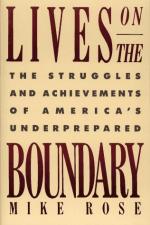
|
| Name: _________________________ | Period: ___________________ |
This test consists of 15 multiple choice questions and 5 short answer questions.
Multiple Choice Questions
1. What rank was Andrea in her high school class?
(a) 15th out of 500.
(b) 13th out of 500.
(c) 8th out of 500.
(d) 1st out of 500.
2. What did Mike's mother bring home to read when he was a child?
(a) Hollywood tabloids.
(b) Classical books.
(c) Astronomy books.
(d) Math books.
3. According to Mike what was a nickname for remedial sections in the 1930s?
(a) Sick sections.
(b) Remedial sections.
(c) Counteractive sections.
(d) Average sections.
4. What was Jerry Williams addicted to?
(a) An illegal drug.
(b) Alchohol.
(c) A prescription drug.
(d) Racing.
5. According to Mike who initiated counter literature?
(a) William Labov.
(b) Steve Labov.
(c) John Labov.
(d) Ray Labov.
6. Who was the historian of numeracy?
(a) Patrica Cohen.
(b) Patricia Cohen Cline.
(c) Patricia Cline Cohen.
(d) Patricia Cline.
7. According to Mike, what type of assessment of students was more legitimate?
(a) Local.
(b) Worldwide.
(c) Federal.
(d) State.
8. Who tallied the percentage of students that misspelled mortgage?
(a) M.T. Guiler.
(b) W.S. Guiler.
(c) S.W. Guiler.
(d) T.M. Guiler.
9. According to Mike how did educators in the 1930s view literary problems?
(a) From a medical remedial perspective.
(b) From a remedial perspective.
(c) From a medical perspective.
(d) From an insightful perspective.
10. What did Mike say that turn-of-the-century English education was built on?
(a) Latin grammar.
(b) Greek grammar.
(c) English grammar.
(d) Latin and Greek grammar.
11. What did Jon tell Mike that he wanted to be?
(a) A teacher.
(b) A public speaker.
(c) An artist.
(d) A writer.
12. Who said "It is what we are excited about that educates us"?
(a) Elizabeth Ewen.
(b) Michelle Ewen.
(c) Jane Ewen.
(d) Alison Ewen.
13. What did Mike's increased work in the Tutorial Center force him to participate in?
(a) Policy making.
(b) Teaching.
(c) Public speaking.
(d) Leadership.
14. Who wrote "Remedial Cases in Reading"?
(a) James Gray.
(b) William S. Gray.
(c) John Gray.
(d) Steve Gray.
15. What class were developmental students required to take at a state college in Ohio?
(a) English and Grammar Usage.
(b) Remedial English.
(c) Advanced English.
(d) Basic English.
Short Answer Questions
1. What did Mike say Aphasia was?
2. What literature course did Mike teach during his time with the Veterans' Program?
3. What kind of student were most of the veterans considered to be?
4. Where did Andrea immigrate from?
5. How old was Andrea when she moved to America?
|
This section contains 380 words (approx. 2 pages at 300 words per page) |

|




